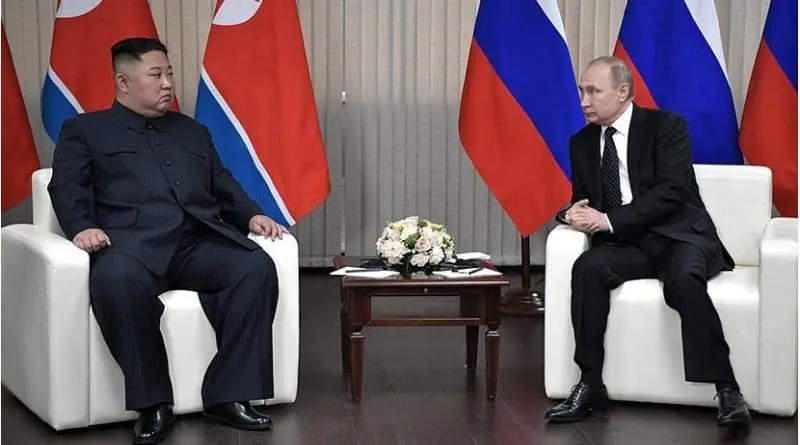Could Russia Provide An End To North Korea’s Strategic Solitude? – Analysis
By Artyom Lukin
From 12–17 September 2023, North Korean Supreme Leader Kim Jong-un made an official visit to the Russian Far East. Compared to his first trip, which took place from 24–26 April 2019, the voyage was both longer and more extensive. Kim’s itinerary left little doubt that a major focus of his visit was to promote military and technological links with Russia.
Kim held a one-day summit with Russian President Vladimir Putin in Vostochny. The Russian host gave his North Korean guest a tour of the spaceport, highlighting Russia’s main rockets, Soyuz and Angara. Kim then proceeded to an aviation centre in Komsomolsk-on-Amur where some of Russia’s most advanced warplanes are manufactured.
The final leg of his tour across the Russian Far East was Vladivostok, where Kim spent two full days. He visited an airbase where he was shown an array of Russia’s fighter jets and strategic bombers. The North Korean leader was also hosted aboard a guided-missile frigate.
Not much is known about the substance of the Putin–Kim talks at Vostochny. No joint statement was released and no agreements were signed. Putin and other Russian officials made clear that ‘all issues’, including the possibility of bilateral military cooperation, were discussed. North Korea presented the visit as a milestone in ‘strengthening strategic and tactical cooperation between the two countries’.
The Kim–Putin summit was followed up by dispatching Russian Minister for Foreign Affairs Sergey Lavrov to Pyongyang in October, which coincided with the 75th anniversary of the establishment of diplomatic relations. Lavrov held talks with his North Korean counterpart Choe Son-hui and was given an audience with Kim Jong-un.
The Russian foreign minister called Moscow’s relations with Pyongyang a ‘strategic, all-encompassing partnership’. This was apparently the first time the Kremlin had publicly used the term ‘strategic’ to describe bilateral cooperation with North Korea.
There are several factors driving Russia and North Korea closer together. Apart from Syria, North Korea is the only United Nations member that recognises Crimea, Donetsk, Lugansk, Zaporozhye and Kherson as Russian territories. North Korea’s willingness to openly defy the West and speak in support of Russia has its own value for Moscow.
There is little doubt that Moscow’s embrace of Pyongyang is also motivated by South Korea’s support for Ukraine. South Korean President Yoon Suk-yeol has emerged as one of the major international backers of Ukrainian President Volodymyr Zelensky. Despite Seoul’s assertions that it only provides non-lethal aid to Ukraine, it is an open secret that South Korean artillery shells, officially sent to backfill US weapons depots, are highly likely to end up killing Russian troops on the Ukrainian frontlines.
There are also economic calculations behind Moscow–Pyongyang engagement. North Korean labour in exchange for Russian cash and commodities would be the most logical area for commercial partnership.
The possibility of North Korean arms deliveries to Russia is perhaps the most intriguing aspect of Kim’s summit with Putin, although both North Korea and Russia deny that this was on the table. In any case, North Korean weapons, even if they do arrive in Russia, would at most play an auxiliary role in Ukraine.
Pyongyang may have short-term commercial considerations, such as receiving Russian cash, oil and food in exchange for labour and munitions. But it is a long-term balance-of-power calculation that likely appeals most to Kim Jong-un.
Nuclear weapons have made it possible for North Korea to feel secure in its strategic solitude. But like all weapons, nuclear weapons are susceptible to technological change. Pyongyang faces the grave risk that its nuclear weapons may be trumped by new emerging weapons. Its most cutting-edge delivery vehicles are already woefully outdated by US and Russian standards.
North Korea’s conventional forces are no match for the combined might of the US–South Korea alliance nor in any way equipped to handle a new era of highly accurate weapons, remote sensing and powerful artificial intelligence.
Nuclear weapons may, for now, provide Pyongyang with a deterrent against head-on aggression, but they are useless in most other crisis scenarios. Kim Jong-un cannot use his nuclear weapons in a war he expects to win. The emergence of a US–South Korea–Japan coalition, epitomised by the recent trilateral summit at Camp David, makes the situation even more worrying for North Korea.
There is no realistic way for North Korea to close the widening gap in modern warfighting capabilities on its own. The only way to address the increasingly precarious balance of military power is to look for strategic allies.
Moscow may become a willing suitor, providing the North with critical non-nuclear weapons and technology such as reconnaissance satellites and fighter jets. Russia and North Korea could even stage joint military drills, a possibility hinted at even prior to Kim’s visit.
The years ahead will see a return to the Cold War era when Moscow and Beijing acted as guarantors of Pyongyang’s security. But this time the division of roles will be different. China will stay on as Pyongyang’s main economic benefactor and diplomatic protector while Russia plays the role of the North’s main military partner. Moscow will be happy with such a role if only because it has little to lose with Washington, Seoul and Tokyo.
About the author: Artyom Lukin is Associate Professor and Deputy Director for Research at the School of Regional and International Studies, Far Eastern Federal University, Vladivostok.
Source: This article was published by East Asia Forum and a version of this article was first published here in 38 North.

